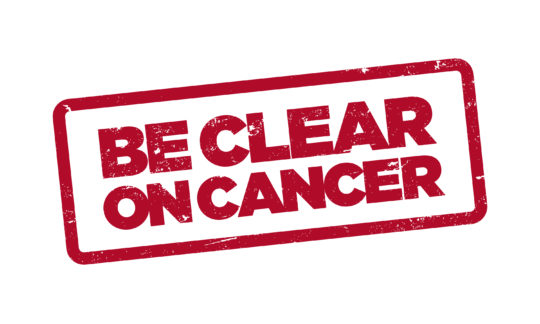25th April 2016
Be Clear on Cancer Campaign

April 2016
Successful Be Clear on Cancer campaign returns - highlighting blood in pee as a key symptom for both bladder and kidney cancers
- Findings from previous campaigns show more people being aware of symptoms to look out for and being prompted to visit their GP
- Data from the 2013 campaign period showed:
- around 18% more people visited their GP with blood in their pee[1]
- an increase in bladder and kidney cancer diagnoses resulting from an urgent GP referral for suspected urological cancers by 8.2% and 22% [2]
- an uplift in early detection which may have prevented over 90 deaths1
- If you notice blood in pee, even if it’s ‘just the once’, tell your doctor.
Public Health England has launched a nationwide ‘Be Clear on Cancer’ campaign with the aim of raising awareness of a key symptom for both bladder and kidney cancers – blood in pee.
Around 17,450 people in England are diagnosed with bladder or kidney cancer every year and around 7,600 people die annually.[3] Blood in pee is a symptom in over half of bladder cancers and almost a fifth of kidney cancers,[4]so being aware of this is crucial.
The Be Clear on Cancer ‘blood in pee’ campaign ran nationally in 2013 and 2014. Analysis of diagnoses during the 2013 campaign period shows a statistically significant increase in the number of bladder and kidney cancers diagnosed at pre-cancerous and early stage, and a reduction in late stage diagnoses for bladder cancer. This early detection has been equated to the prevention of around 70 bladder cancer deaths and about 25 kidney cancer deaths.3 Whilst it is not possible to link these findings to the campaign in isolation, the findings suggest that it is highly likely that the campaign has made an impact.
Early diagnosis of bladder and kidney cancer increases the chances of survival. For those diagnosed at the earliest stage (stage 1), the likelihood of surviving five years or more can be as high as 84% for kidney cancer and 77% for bladder cancer.3However for those diagnosed at a late stage (stage 4), survival is as low as only 10% for kidney cancer and 9% for bladder cancer.3
The campaign is aimed at men and women aged 50 and over, as between 90 - 97% of bladder and kidney cancer diagnoses are in people in this age group.3,[i] It encourages anyone who notices blood in their pee, even if it’s ‘just the once’, to visit their GP to get it checked out. Given that people may not spot blood in their pee unless they check, this year’s campaign also promotes a “look before you flush” message, particularly to women, who may be less likely to do so.
Doctor Jenny Harries, Regional Director, for South of England, Public Health England said:
“Evidence shows that Be Clear on Cancer campaigns really do make a difference. The rise in the number of bladder and kidney cancers being picked up early is important; it is this early detection that saves lives. It’s vital that we all do our bit to raise awareness that blood in pee could be an early sign of bladder or kidney cancer, and encourage anyone with this symptom to go to their GP. We know that people don’t always immediately visit their doctor if they spot blood in pee, which can be for a number of reasons – some might ignore the symptoms, especially if it only happens once, or may pass the symptom off as cystitis. If you do notice blood in your pee, don’t wait for it to happen again before getting it checked out, visit your GP straight away.”
BBC journalist and radio presenter, and kidney cancer survivor, Nicholas Owen, commented:
"I was extremely lucky because my tumour was found early. Early diagnosis saves lives, so everyone should look out for key symptoms, like blood in your pee. Don't delay, the sooner you speak to your GP, the sooner you know what you’re dealing with.”
Ian Lavender, actor and star of Dad’s Army who is a bladder cancer survivor, said:
“I’m supporting this year’s ‘Blood in pee’ campaign as a survivor of bladder cancer. It’s a simple message “look before you flush” and make sure you go and see your GP if you notice blood in your pee. Spread the word, someone you know might have this symptom and reminding them to get it checked could save their life - it saved mine, and I’m 70 and still happy to be working.”
For further information about the signs and symptoms of bladder and kidney cancers, including leaflets in alternative formats, please visit nhs.uk/bloodinpee
Resources
[1] Data supplied by Public Health England.
[2] Data supplied by Public Health England using NHS England’s Cancer Waiting Times database
[3]Incidence and mortality data supplied by Public Health England based on the National Cancer Registration Service dataset
[4]Shephard, E.A., Stapley, S., Neal, R.D., Rose, P., Walter, F.M and Hamilton, W.T. (2012) Clinical features of bladder cancer in primary care. The British Journal of General Practice. 62 (602), pp598-604 and Shephard, E.A., Neal, R.D., Rose, P., Walter, F.M and Hamilton, W.T. (2012) Clinical features of kidney cancer in primary care: a case-control study using primary care records. The British Journal of General Practice. 63 (609), pp250-255
[i] Statistics based on the annual average for 2009-2013













